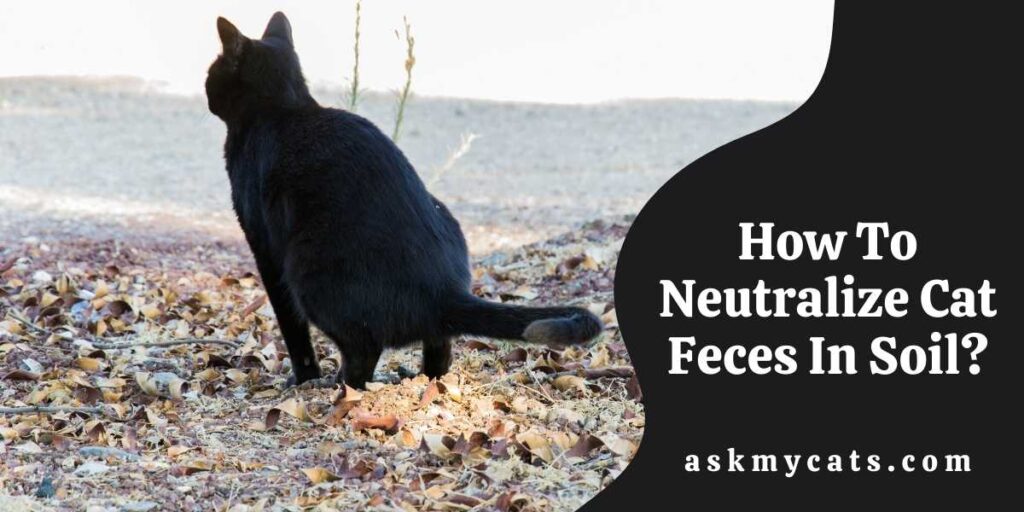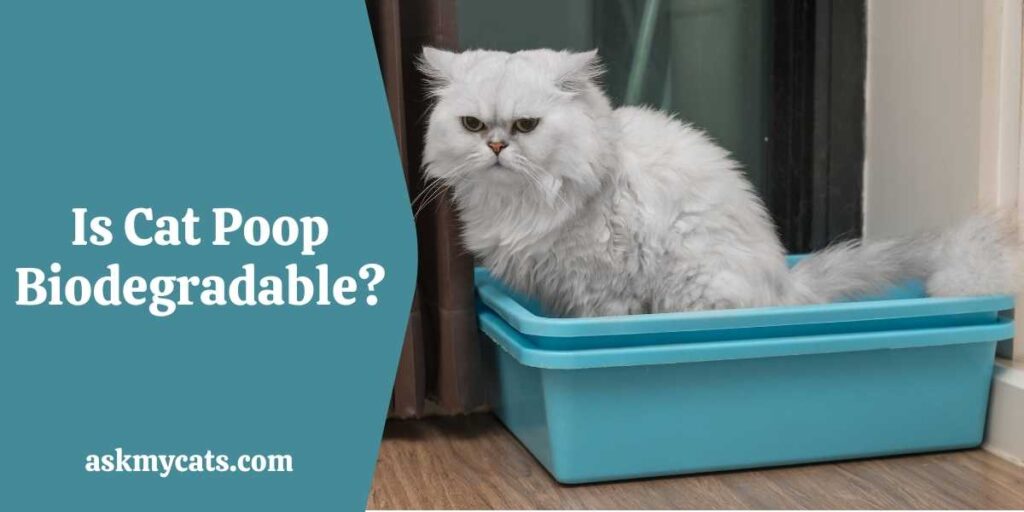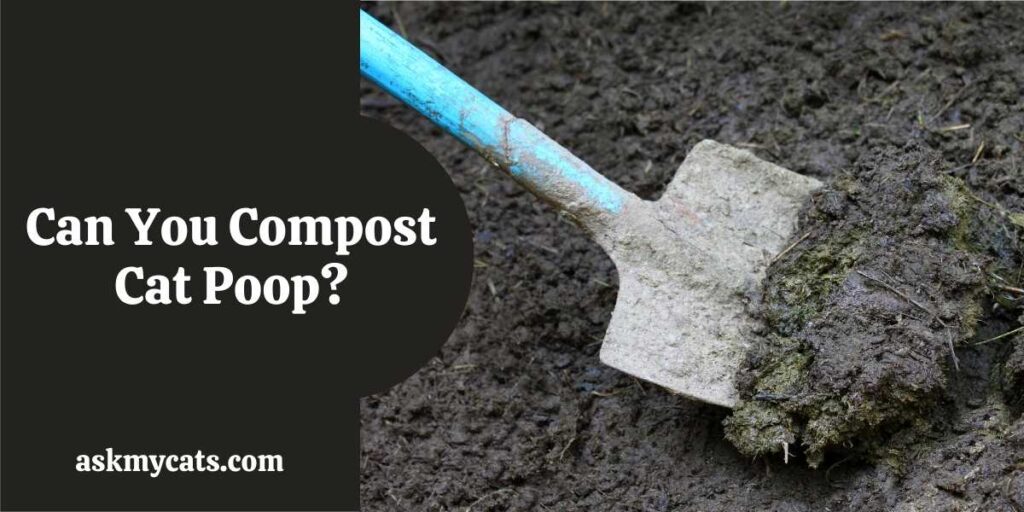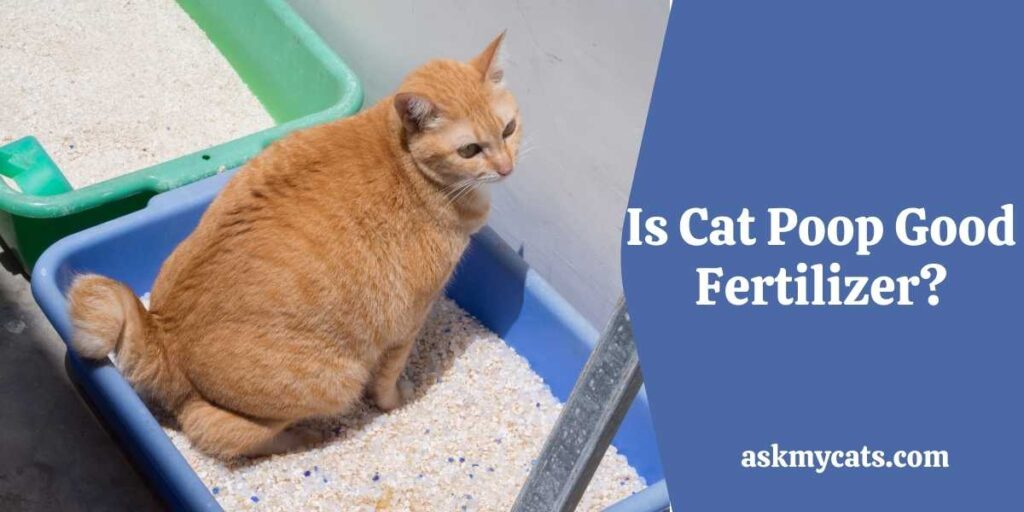Many gardeners use nutrient-dense manure to enhance their soil, but there’s a big difference between putting cat waste on the lawn and spreading steer dung.
For neutralization, cat feces must either be sterile or needs to be composted and heated to remove any pathogens in the manure used in gardens before it can be used in gardens.
In addition, most individuals do not (or should not) use fresh animal manure in their gardens. Fresh excrement from a steer or a pet in the garden might have a range of illnesses.


Give Your Cat the Perfect Day
Get the Free Ebook!
Is Cat Poop Biodegradable?
Yes, cat poop is biodegradable if you compost it for enough period of time.

It’s not only unpleasant to smell cat feces in the garden soil when you’re working in the vegetable patch; it’s also potentially dangerous to your health. It can host bacteria and parasites that cause diseases, including toxoplasmosis and other ailments, according to the University of California Master Gardener Program of Contra Costa County.
Without first excavating and removing the top layer of soil from a badly contaminated garden bed, it is impossible to plant vegetables.
However, just because a cat uses your vegetable garden bed as a toilet occasionally does not mean your vegetable garden bed is permanently destroyed.
Given their love for beautifully tilled beds with the friable ground in which to defecate, it’s no wonder that cats prefer soft dirt that’s simpler to dig in.
Cats are creatures of habit, and if they repeatedly return to the exact location, the problem may quickly escalate into a large number of feces if it isn’t examined and addressed regularly.
Sweep up any feces and surrounding soil with a shovel while shielding your hands from the outdoors while wearing rubber gloves and a dust mask.
Any product that has come into contact with feces should be discarded, particularly root crops like carrots that grow underground.
Can You Compost Cat Poop?
Yes, you can compost cat poop.

Cat excrement has roughly the same amount of phosphate and potassium as bovine dung and has 2.5 times more nitrogen. Because the high nitrogen concentration appears to be better for plants, it also poses a danger of parasite and disease contamination.
Composting it and its contents is the superior alternative if you genuinely want to get the most out of your kitty litter.
First and foremost, keep your compost pile away from any locations where food is grown. If you’re going to utilize a bin, make sure it’s at least one cubic yard/meter. This will make it easy to flip your pile and keep it accessible.
A smaller bin is more challenging to deal with and does not heat up as quickly or thoroughly. Bigger is preferable in this scenario.
Carefully select the litter you’ll be dealing with. Clay litter and litter containing deodorant crystals are not allowed. To break down in the compost bin, your waste must be entirely made of plant-based materials.
Even though cat feces contain nitrogen, you will need to add extra nitrogen to your compost to make it function. The carbon content of the litter is too high for the nitrogen content of the cat litter to balance on its own.
You can use any of the following nitrogen sources: natural seed meal fertilizers, plant material, fresh grass clippings, dried alfalfa; fresh cow, chicken, or horse manure; or even leftover vegetables from your salads.
As these additional nitrogen sources decompose, they will assist in composting.
Make sure the compost pile is kept wet. Keep an eye on it to make sure it’s breaking down properly, and add what you need when you need it to maintain balance.
Another thing to keep in mind is that you should let the composting rest for at least two years before utilizing it.
If composting all of the waste seems like too much work at first, you may flush or dispose of the excrement and compost only the litter (considering that you use biodegradable litter). That’s a fantastic start and an excellent approach to help the environment become a little greener.
Is Cat Poop Good Fertilizer?
Yes, cat poop is an excellent fertilizer for non-edible plants like flower gardens and shrubs. Since cat excrement causes many health problems, it should never be used on food plants or crops.

In comparison to other herbivores, cat excrement has significant nitrogen, phosphorus, and potassium concentrations since it is an omnivorous mammal.
However, it is highly possible to be contaminated with parasites and disease organisms that pose serious health hazards.
As a result, composting cat excrement is a bad idea if you are going to use it in edible plants. However, this does not mean that cat poop composting is entirely useless; after two years of good composting, it may be utilized for non-edible plants such as lawns, shrubs, and aesthetic plants.
Cat poop can be a good fertilizer when composted. However, excessive use of cat poop as a fertilizer is not recommended.
Compared to other animal dung products such as cow and horse dung, cat poop is a valuable waste resource with high nitrogen, phosphate, and potassium content that may be used in flower beds and lawns.
The majority of pet owners are unaware of how much valuable plant food is included in cat excrement. Each year, pet dogs and cats produce millions of tonnes of manure, most of which is disposed of in landfills or sewage treatment facilities.
Cat feces contain significant levels of nitrogen and phosphorus, which may be utilized to meet the nutritional requirements of plants if appropriately handled.
The only explanation for the massive waste of plant feed material in the form of pet feces is a lack of knowledge. People are unaware of the advantages of utilizing pet feces as fertilizer or how to apply it.
You might also like to read how long does it take for a cat to decompose
Does Cat Poop Break Down In Soil?
Yes, cat poop can break down in the soil if it is composted properly.
Cats are omnivores, which means they eat a wide variety of foods, including pests or small creatures. The parasite-infected stool will arise from this contaminated diet.
Toxoplasmosis is a parasite found in cat feces harmful to both people and animals. Cats are the only animals that discharge parasite eggs in their feces.
Headaches, muscular pains, and flu symptoms are caused by human interaction with this parasite. Furthermore, toxoplasmosis can make persons with immunodeficiency disorders like AIDS worse.
Furthermore, it can be deadly for pregnant women, resulting in birth abnormalities.
In addition to toxoplasmosis, parasites for intestinal worms such as roundworm, tapeworm, and hookworm are frequently found in cat feces.
Wearing gloves, washing hands, and rinsing and washing the crops are the best ways to avoid parasite infection.
Composting cat excrement is another approach for dealing with parasites, although it only kills the parasites to a certain amount. Cat excrement can be composted and used in non-edible plants such as lawns, shrubs, and other decorative plants with caution.
The compost pile temperature should reach 165 degrees F to destroy the parasite in cat feces compost. It is, nevertheless, difficult to achieve. However, take measures while handling cat excrement to reduce the danger of parasite contamination.
You’ve probably heard of utilizing cattle and horse dung in crops as an organic fertilizer. However, because cat excrement is a parasite-infested fertilizer, it cannot be utilized on food crops such as vegetables and fruit trees.
People can become infected with dangerous microorganisms carried by cat feces by ingesting edibles treated with cat excrement compost.
How Long Does It Take For Cat Poop To Decompose?
Cat poop takes around two years to decompose entirely.
During these two years, the cat excrement completely decomposes into a tough substance with high nitrogen, phosphorus, and potassium content. Most germs and parasites are killed after two years of composting.
Using the cold composting method, it will take at least a year to compost leftover cat litter. Hot composting might take as little as a few months, but you’ll have to put in a bit more work.
Cat excrement that has been composted is a ready-to-use substance for non-edible plants. After two years, you’ll have completed compost, which you may use to grow any form of the plant other than food.
Frequently Asked Questions
What does cat poop do to the soil?
Cat feces have nearly the same amount of phosphate and potassium as bovine dung and include two and a half times the amount of nitrogen. They also include parasites and disease germs that might harm one’s health. As a result, it’s possible that composting cat litter and its contents isn’t a brilliant idea.
Will cat poop hurt my plants?
You may believe that cat excrement is natural and will not hurt your houseplants. However, it has the potential to cause them significant harm. The issue is that the cat poop may contain harmful pathogens that will end up in your plants. It’s much worse if you’re producing fruits and veggies for your consumption in pots.
What does cat poop look like in the garden?
Most cat excrement has a firm, pliable consistency but is not mushy. The consistency, akin to modeling clay, is frequently a source of frustration for gardeners! Even the healthiest cats shouldn’t have very foul-smelling excrement, but some odor is expected.
Final Words
You can neutralize cat feces in the soil by composting it. The completed compost of cat excrement and straws has significant phosphate and carbon levels, which helps boost soil productivity and organic matter.
It’s a good idea to use cat poop compost around bushes to get the most out of cat excrement without putting yourself at risk.
Ask your questions in the comments section below.
